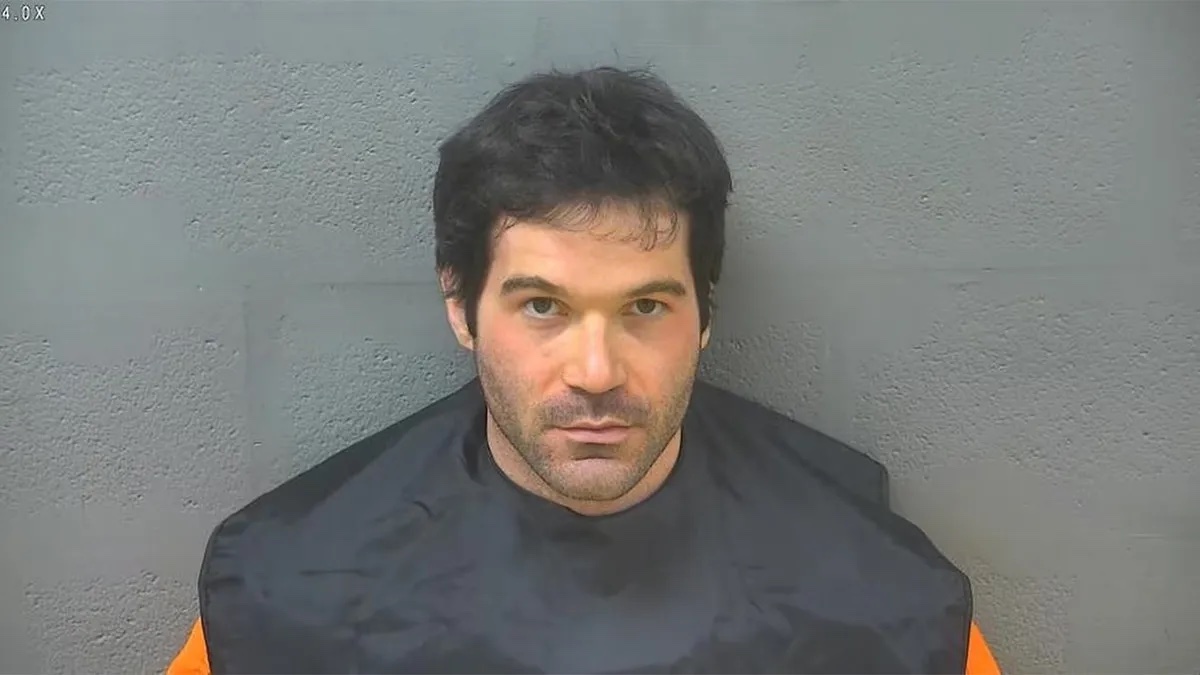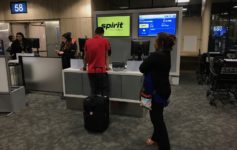
In a court filing, American Airlines argues that it should not be held legally liable for the conduct of its flight attendant who surreptitiously filmed underage girls in aircraft lavatories. Does AA actually have a point?
American Airlines: Don’t Blame Us For Malicious Acts Of Flight Attendant
Estes Carter Thompson III was arrested by the FBI where hundreds of child porn photos were found on his mobile phone, including images of girls as young as seven years old he captured onboard.
A girl who noticed a cell phone taped to the lavatory toilet lid alerted her parents who alerted authorities. In their lawsuit against American Airlines, one of the families says that American Airlines “knew or should have known” that its flight attendant was engaging in this injurious conduct.
Is that really the case? And should companies be held liable for every crime committed by their employees?
In legalese, vicarious liability or respondent superior (“let the master answer”) is the idea that employers are held liable for the actions of their employees. Here, the claim is that American Airlines should be held responsible for the criminal actions of its flight attendants.
A key question in determining whether an employer is liable is whether the employee acted within the course and scope of employment.
This case is not like a pilot who gets drunk and crashes a plane. Or a flight attendant who punches a passenger during the beverage service. But should American Airlines still be liable even though filming in a lavatory has nothing to do with the duties of a flight attendant?
To answer the question, these three questions are often considered:
- Was the act committed within the time and space limits of the employment?
- Was the offense incidental to, or of the same general nature as, the responsibilities the employee is authorized to perform?
- Was the employee motivated to any degree to benefit the employer by committing the act?
Sexual misconduct is a clear departure from the scope of employment and also from the reasonably foreseeable conduct of a flight attendant onboard a flight. I do have some sympathy for AA’s claim that it cannot be liable for an employee who so grossly steps outside of his role as a flight attendant.
That said, this is just a standard procedural move by AA and it seems clear to me that this case (and the others that will come) is heading for a generous settlement to make it go away. But was AA negligent here? I haven’t seen the evidence for it yet…
CONCLUSION
Beyond the civil lawsuits, Thompson faces multiple charges from federal prosecutors and may spend the rest of his life in jail. But when you think about whether American Airlines should be liable, think about what it could have done differently? Does AA now need to ask employees to surrender their phones or social media passwords? What could AA have done any differently to prevent this? Sometimes a pervert is going to be a pervert. He should pay…but I’m not convinced AA should.
image: Blue Ridge Regional Jail Authority




Should AA pay? Borderline. Did AA carefully, fully and attentively vet the employee in question?
United Airlines now prohibits Flight Attendants from using their personal cell phones while onboard the flights they are working.
A story that I broke. It is an interesting parallel.
I think AA would be responsible:
– for failure to properly supervise its employee while working
– he do not enter a restricted area of the jet
– the employee in question has ready access to the area were the incident occurred
– any faults in the employment application (ie: priors or criminal background) which were not detected with due diligence review
– any failure to denote such behavior in quarter / annual reviews of performance
– any prior incidences with customers on prior work assignments
– failure of AA to monitor social media accounts which mention AA or its employees
– substantial financial gain from indecent(s) and living beyond your means (which I have seen as a trigger point for review)
– lack of a company hotline where employees can submit confidential observations
– lack of follow up if such a hotline exist
AA can file multiple briefs, but chances are AA will attempt to settle via a series of payments with a trigger to stop payment if any disclosure.
The flight attendant was in a position of authority, wearing a uniform and being paid by AA. AA also initially apologized. One of the victims was an unaccompanied minor. ( fifty photos asleep in the cabin seat). Attorneys for AA can try to weasel out of this but, in the end they own it. Putting young children through depositions, and testimony will make the inevitable award more. When you find yourself in a hole, quit digging.
American Airlines failed to supervise their employee. How exactly does one take 50 cabin photos of an unaccompanied child unnoticed? Only when the culture chooses to look away.
Going forward, they should have yearly background checks ( including monitoring social media and interviews) They are the law in the air and must be trustworthy.
It will be interesting how two goals: A safe workplace via mass background checks and more training/testing of employees conflicts with a more inclusive, diverse workplace where employees don’t want to feel continually monitored.
What’s next? Making FA’s wear body cams? Hmmmmmm, come to think of it that’s not an entirely bad idea. Matt may want to comment on that in a whole separate article!
That being said, the plaintiff appears to be on a clear money grab. If I see a robbery about to happen, leave and notify authorities, do I sue for damages? The plaintiff did a wonderful thing by documenting and reporting the conduct and now they want to still sue as if they were damaged.
@ Polish Knight
FAs have access to the flight deck and secured areas of the airports. They are also the safety officers in the sky. They should be screened regularly. If anyone cannot meet these standards they need to find other employment.
These small kids were harmed by having trust in authority and privacy taken away. The example of a fully formed adult mind experiencing a minor trauma cannot be compared.
Not sure if fully liable but for sure AA failed in the process of hiring him. They basically missed important points on his behavior so that does not look good for them.
AA is correct here that company shareholders should not be held responsible for the rogue actions of an employee. What is a company supposed to do about an employee who commits a crime. It’s like suing the police for not arresting someone before the person has committed a crime. A company is only responsible if there was a pattern of conduct witnessed, that should have been witnessed, or where due diligence was not done in hiring.
Your lack of awareness staggers me.
He’s actually pretty hot. I’d do him.
I disagree…. the employee was on duty, working a flight, and on company property. Therefore, this should fall under the ‘articles of conduct’ set forth by the Company. You are in uniform and representing the Company. This is inappropriate behavior while on Company time.
To my mind, this is a clear case of vicarious liability. The person was placed by their employer in a position of authority and they abused it more than once. The claimants can make the very simple point that most airlines have cabin managers who are trained, experienced, and responsible for detecting signs of unprofessional conduct and doing something to address it- either AA use them and they’ve failed at their management duties or they don’t use them and the incident is a symptom of a deficient approach to human resource management.
So many lawyers here! How did everyone get so smart?
I wonder how many actually passed the exam?
As anyone who’s ever been anywhere near law school would happily confirm, ignorantia juris non excusat.
If you have to obey laws, and particularly if you happen to have the right to vote for lawmakers, you could do a lot worse than investing some time reading up on laws and on the judicial process. Developing an understanding of the legal system isn’t about becoming a lawyer, it’s about being prepared to defend one’s rights and improving their access to participation in civic life.
You should know that the law has nothing to do with knowing or learning it as law is always a matter of opinion and can be simply ignored or reinterpreted or changed based on a fabricated precedent or standard created out of thin air. Leftist judges for instance will do anything to advance their agenda which means they will outright change definitions of words and ignore every precedent to rule in a way that serves their cause. On the other hand conservative judges foolishly adhere to the above and don’t use their positions to undermine a system which is antithetical to everything conservative because they think there is honor in losing and playing fair, not that acceding to the laws of 51% is fair.
Most people are rubber stamps for government but you can have your say on what is law by voting not guilty or finding for the defense on a criminal or civil jury. It doesn’t matter what lawyers, judges, politicians, or the average person thinks about law if you serve on a jury.
Well, obviously the vast majority of court decisions involve discretion by judges and/or juries. Understanding the law is helpful irrespective of that – particularly in civil matters which often don’t even go anywhere near the courts.
The leftist/conservative distinction is very simplistic – there’s even evidence to suggest that sentencing tends to be harsher before a judge’s lunch break than after.
Don’t disagree. It’s helpful to be knowledgeable. Since we might be witnesses who can shape our testimony or jurors who can nullify one day, you are correct it is good to know how others make their decisions or don’t make their decisions. I was on a Fed civil jury less than 10 years ago. I would love to be on another one.
You can’t screen for mental illness or a whole assortment of deviant behavior for every employee, can you?
Tony N,
There are clues.
Example A…..Aaron and his infatuation with c#ck. And his fighting with anyone and everyone who thinks it’s not normal to lick the sh#t off another man’s member.
Obviously his company doesn’t know the depths of his depravity so should they be responsible for his actions on the road while they finance it? Interesting debate.
Are his posts here warning signs they should have noticed? Or are his claims of getting sick at the thought of vagina making him a protected class legitimate?
Bottom line is we are all happy we don’t have this ass pirate as an employee.
You are a lawyer.
Tell us about ETC, vicarious liability, negligence and case laws etc…
This article is too simplistic /:
Just like you screen new employees for drug addiction (sort of, with a urine test), they should screen employees regularly for mental and physical health, and esp. depression, suicidal pilots.
It’s quite simple in that no way does AA want this in front of a jury. Or increasing press. These were young girls. It occurred on a sealed plane by someone who is, according to their own mantra, there for your safety. And empowered with this as we are often reminded.
Pay them each millions and bury it. The alternative will be an absolute mess for AA otherwise. With the unknown of that one employee who later comes forward and reports, “I informed a supervisor of his odd behavior but he/she ignored me.”
+1. The only reason the pervert was able to do this is because the position AA put him in. American needs to butch up and accept responsibility. Otherwise the civil trial juries will impose vast punitive damage penalties because they’re so awful little girls.
Correction – awful to little girls.
The only defense AA would have is if the FA was a Republic or Skywest FA
The initial question was ? “ was the employee acting within his responsibilities as an employee?”
Face value YES, the employee had access into the toilet area as a part of his duties as called for under his employment instruction responsibilities.
Now future, have there been any previous comments made to the employer that there may be certain sexual tendencies of this employee previously identified and reported by others.
Once again, a court decision needing to be made by the personnel decision of an individual judge or judges hearing the matter.